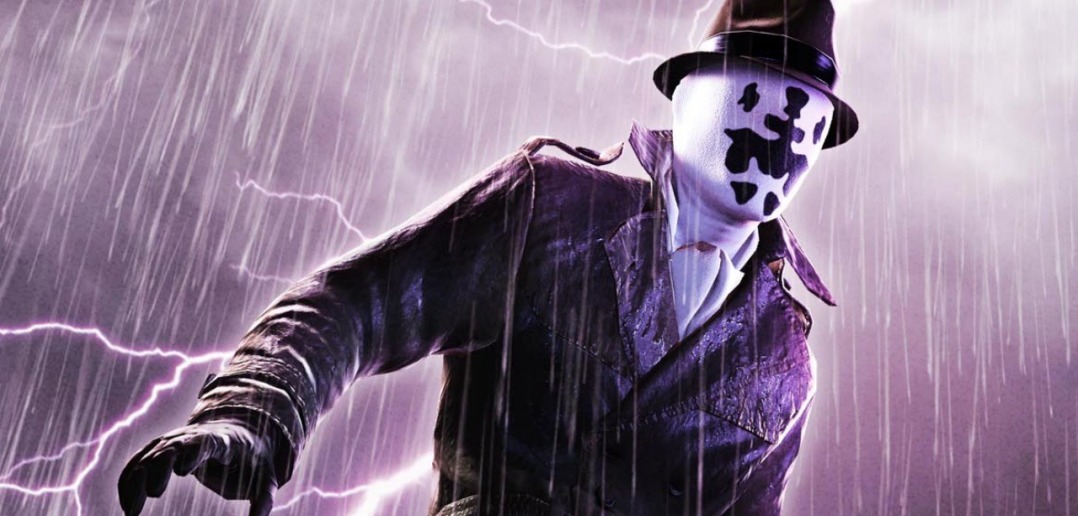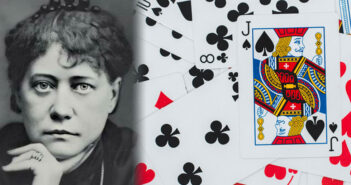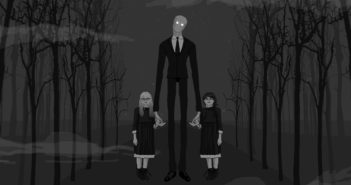A confused mixture of sighs and laughter ensued as I read Brian Doherty’s column on Reason Online titled “Rorschach Doesn’t Shrug: The Watchmen’s hero as Objectivist saint.” The entire premise of Doherty’s essay was an effort to paint Rorschach as the “moral center” of Alan Moore and Dave Gibbons’s Watchmen. Doherty, a published author and senior editor at Reason magazine, presented several examples of the bone-breaking and murder-friendly vigilante that framed him as someone to be admired instead of feared and pitied.
Doherty reflected on Rorschach as a misunderstood but morally outstanding figure, smeared and misconstrued by whiny and weak liberals. On more than one occasion, Doherty pointed out that Rorschach operates on a pure code of objective right and wrong, a code that he will not compromise for anyone, making him a romantic individualist hero of which “[Ayn] Rand would have been proud.” But Rorschach is not a heroic purist because he delivers his judgments on an individual basis instead of operating within a collectivist structure—he is, at his core, a pained psychopath looking for an end.
The most important element of the entire Watchmen story is that all of the superheroes within its pages are caricatures designed to demonstrate how silly, ridiculous, and sad superheroes would actually be if they existed. Rorschach is no exception. He’s not in the comic book to exhibit an irony that the one person labeled as “crazy” is actually the sole figure operating logically and rationally in the world around him. While Doherty praised Rorschach as a character worthy of Randian values, he missed the entire point of Moore’s story: “Who watches the watchmen?” Moore used Rorschach as the most extreme example of pavement-pounding vigilantism to demonstrate to his readers that no one in their right mind would want someone like that wandering around exacting his or her own uncompromising (and brutally violent) sense of justice.
It’s apparent that Rorschach hunts down the worst of society’s ills, criminals that few would defend: rapists, pimps, murderers, gang leaders, and thieves. Most would turn an eye to someone like Rorschach taking such hardened criminals down. But where does Rorschach’s brutal brand of justice end? This is where Doherty’s argument in favor of the character’s objective values weakens, as Rorschach is filled with a lot of silly and weird quirks and prejudices that are all subjective aspects of his own personality. For example, Rorschach is an obvious misogynist who refers to the Comedian’s attempted rape of Sally Jupiter as a “moral lapse.” When informed that his own mother (a child-beating prostitute) was killed by her pimp, Rorschach only answered with one word: “Good.” He also harasses the villain Moloch (who’s dying of cancer) over non-prescribed painkillers he’s popping as well as an unlicensed handgun he owns. Homosexuality is something else that Rorschach finds unsettling, as he obsesses over Adrian Veidt’s sexuality and deems it worthy to thoroughly investigate.
All of the discriminatory beliefs listed above not only demonstrate that Rorschach is not a hero working from an objective set of values, but that he’s also silly in just how apolitical he really is. America’s farce of a drug war, for example, is something liberals revel in as much as conservatives, despite Rorschach’s continuous snide comments about left-wingers. His menacing concern over Moloch’s unlicensed handgun is also an amusingly obsessive aspect of Rorschach’s character—something I think Doherty would agree with me on, considering the fact that he authored a book titled Gun Control on Trial. All of these attributes add up to Moore’s entire premise of the book, that no one person—especially not Rorschach—has the right to decide the enactment of justice. If he did not die at the end of the story, the day could have very well occurred when Rorschach decided that all women and homosexuals deserved to be punished and that he was the only one capable of doing so. And like the Ouroboros, the story returns to its basic premise: “Who watches the watchmen?”
Doherty’s column turned comical when he pitched the idea that Ayn Rand, based upon her ideals and political beliefs, should have been the one who invented the superhero model. Thankfully, Rand spent a generous amount of time cheating on her husband and hammering out painfully boring novels, so that she was left with no time to take a stab at polluting the superhero pool. To even suggest that the concept of the superhero should have been spawned from Rand’s droning imagination simplifies the symbolism of superheroes to an absurd degree. Masked warriors by their very nature fight for people who cannot defend themselves and act on behalf of a larger cause, which evokes a word that is pure profanity within the Randian lexicon—altruism. Ayn Rand was a woman who penned a book titled The Virtue of Selfishness, vehemently apposed any and all forms of charity, and promoted pure and unfettered laissez-faire capitalism. But don’t take my word for it. In a 1959 interview with Mike Wallace, Ayn Rand explained, in part, what she felt was wrong humankind’s morality: “I am challenging the moral cult of altruism, the precept that man’s moral duty is to live for others, that man must sacrifice himself to others, which is the present-day morality.” Meanwhile, superheroes by their very nature fight, suffer wounds, endure physical and emotional pain, and even die—all in the ultimate pursuit of a future greater than any one person.
Randian devotees and libertarians can take comfort that the medium of comic books has not totally forgotten their values, however. If one was to draw up a list of characters that rejoice in sheer selfishness and celebrate total personal gain, it would look something like this: Lex Luthor, the Kingpin, the Hood, Dr. Doom, the Penguin, the Green Goblin, etc. While I may sound facetious and even a bit crass in suggesting these characters, most of them are self-made industrialists and entrepreneurs, as well as sharing in the core Randian principal of complete self-interest and personal reward.
Concerning the inspiration responsible for Rorschach’s particular creation, it’s true that the character is designed somewhat after Steve Ditko’s conception of the Question, but it doesn’t reach far past that. All of the characters in Watchmen are used as tools to demonstrate the silliness, absurdity, torment, and sorrow that actual living superheroes would ultimately embody. In the case of Rorschach, he’s a parallel of Batman. But I won’t try to explain something that Moore has already articulated himself. In an interview he gave to LeJorne Pindling of Street Law Productions in 2008, Moore said the following:
“You could put a superhero in the real world for a dramatic effect, because they are kind of stupid. They got these tight costumes, stupid names; they’re kind of unbelievable, so if you actually put them in the real world and have people reacting to them the way that people would, you’d laugh at them, you’d be scared of them. It would be a different way of looking at them, so that’s what went mostly into Watchmen.
“[Gibbons and I] thought about superhero types like Batman, so I thought, ‘What would he be like in the real world.’ And he’d be very much like Rorschach—if you’re a revenge-driven vigilante, you’re not quite right in the head. Yeah, alright, your parents got killed when you were a kid, whatever, that’s upsetting. But for most of us, if our parents were killed when we were little, would not become a bat-themed costumed vigilante—that’s a bit mental.
So, I thought, ‘Alright, if there was a Batman in the real world, he probably would be a bit mental.’ He wouldn’t have time for a girlfriend, friends, a social life, because he’d just be driven by getting revenge against criminals… dressed up as a bat for some reason. He probably wouldn’t be very careful about his personal hygiene. He’d probably smell. He’d probably eat baked beans out of a tin. He probably wouldn’t talk to many people. His voice probably would have become weird with misuse, his phraseology would be strange.
“I wanted to kind of make this like, ‘Yeah, this is what Batman would be in the real world.’ But I had forgotten that actually to a lot of comic fans that smelling, not having a girlfriend—these are actually kind of heroic. So actually, sort of, Rorschach became the most popular character in Watchmen. I meant him to be a bad example, but I have people come up to me in the street saying, ‘I am Rorschach! That is my story!’ And I’ll be thinking, ‘Yeah, great, can you just keep away from me and never come anywhere near me again for as long as I live?’”
The most important aspect of Doherty’s column concerns Rorschach’s unwillingness to compromise his values and his ultimate death at the hands of Dr. Manhattan for not relenting what he believes in. While it was removed from Snyder’s film adaptation, Rorschach does compromise his principles by the end of the Watchmen comic book. In the source material, he’s forced to retrieve a spare costume from his apartment, at which time he’s confronted by his landlady (a woman who lied to the press by saying that Rorschach sexually pursued her out of costume) and her brood of wailing brats. Though he was more than ready to punish the woman through violence, Rorschach relented when he saw one of the landlady’s frightened sons. In the child’s tear-streaked face, he saw himself—someone on the road to psychological ruin because of the irresponsible actions of his parent. Instead of condemning the kid to a future as damned as his own, Rorschach compromised his values to help another person.
Rorschach’s finale in the frozen landscape of Antarctica does demonstrate his unwillingness to concede, but he’s also using his own persona to end his life. Within the plot of the story, Rorschach knew he didn’t have to return to civilization to reveal the truth of Ozymandias’s plot; he already handed his journal over to the press, which was being read at the conclusion of the book. He was confidant that the truth behind the world’s newly founded peace as well as his memory was preserved. None the less, he still faced off against Dr. Manhattan outside of Ozymandias’s stronghold; consistently shouting at the blue god to “do it,” while ripping away his morphing mask only to reveal tears streaming down his face. He was ready for it all to be over.
Moore gave an interview to the BBC documentary Comics Britannia, in which he concluded the ultimate meaning behind Rorschach better than I ever could; he’s not an uncompromising figure of Randian virtue, but a tormented soul searching for an end: “It wasn’t until halfway through that we [Gibbons and Moore] realized Rorschach wouldn’t survive the book. It just became obvious; we realized that this was a character if ever there was a character that had a king-sized death wish. He was in pain, psychological pain, every moment of his life, and he wanted out of it, but with honor—in whatever his own twisted standards of honor might have been.”
This essay originally appeared on Comic News on 26 March 2009.





10 Comments
Your conclusion is flawed in that you mistake Rorschach pursuing a higher ranked value, for him compromising his value set as a whole in the source material.
While he pursues people he considers to be evil, he doesn’t appear to do so at the expense of the innocent. Thus, by sparing the child the torment of losing a parent he is upholding a higher value than that of punishing someone who has wronged him personally, something that’s likely a lower ranked offense to begin with.
I’d also argue that the conclusions of Gibbons and Moore are flawed too, in that it isn’t so much that Rorschach wanted to die but that someone who doesn’t compromise has no choice but to die. Think of people who live by absolute and unwavering rules that are applied evenly throughout their lives at all times. Who comes to mind?
No one, because to live in such a way would require breaking laws and causing mass chaos throughout the established system. The only outcome for such a person would be death; either at their own hand (from the realization that they dwell in a world drowned in compromise and weakness) or that of another (effectively compelled by their own actions). Since we live in a society where we like to pretend we can be morally pure, however, this conclusion isn’t easily arrived at and certainly wouldn’t be broadcast in press interviews to promote a movie.
Yea I believe the writer is to biased to form proper empathy for someone like kovacs. He seems like if he started to think about Walter as as if he was a real person he would stop thinking curiously and start to begin to think pessimisticly . He’s like that guy who locks his doors when he sees a guy with messy hair pass his car. It’s not completely his fault,he just doesn’t possess the patience given that Rorschach is probably far from himself in the moral department. He’d probly feel like a bad person if he emphasized enough to start to like him. He’s like silk spectre. And were night owed trying to explain why not be so stuck up
it’s annoying as hell that neckbearded losers celebrate characters like rorschach. would the morons feel differently if they knew the man who wrote their favorite hero sees them and his own creation as pathetic lunatics ?
The more I here about Alan Moore, the more I’m starting to think he’s a pathetic lunatic. Sounds like a simp.
Look, there’s a smelly girlfriend-less loser now! Thanks for making an example for us, Josh.
While Moore came up with Rorschach’s name and descriptions, Dave Gibbons was in charge of the character’s appearance. Originally in Gibbons’ initial designs, Rorschach wore white clothing which had inkblots not only on his head but all over his body. He also wore a large blue trench-coat, red gloves, red-blue hat and items that look like jodhpurs or spats over his boots.
Amazing to me how people can read what Alan Moore actually said/wrote about the character and still be completely oblivious.
Completely agree with the obvious intention of its author in portraying Rorschach. He is a broken man, self-destructive and without a doubt he is not an example to follow (or at least not in every way), however I consider reductionist the way he is treated as someone human waste; I think that the constructive point of the work is lost when it raised its perspective by analyzing it so lightly on the basis of its weaknesses.
It is true that Kovacs’ morale was not without margin for error, yet none of these moments drastically collide with the way in which his convictions were established, and they are rather a product of the way he grew up. I want to say, it is true that the fact that he minimize what happened to the first silk specter was questionable, however it must also be taken into account that he was openly nationalist and in his view, the comedian’s evils were not enough to establish a complete judgment of her person, although I also do not neglect the idea that in part her prejudice towards the first silk spectrum had something to do with that conjecture as well.
Here is the point with Rorschach’s idea, morality is objective naturally, but it is subject to certain relative values because it arises from the subjectivity of individuals. It is for this very reason that people tend to sympathize with Rorschach, they find his conclusions regarding how to deal with the ills of a society more logical, because he is the only one who acts under terms that are perfectly perceptible. He is not a nihilist who lives chained to his lowest instincts without a particular end, nor is he an idealist who slaughters innocent people to achieve a utopia against human nature itself and of doubtful long-term effectiveness.
In the end, yes, Rorschach was a psychopath whose life was a tragedy and his way of leading it was undesirable. But still he had taken a completely reasonable point of view, which his only limitation was the way he put it into practice (that aggressiveness against innocent people) thanks to ironically the personal problems that led him to acquire it.
These sorts of discussions were so much more rewarding before we had to worry about all the blather endemic to the ongoing savagery between Woke zealots and Alt-Right fanatics.
However, I will say this. First and foremost, Walter Kovacs/Rorschach was shaped by trauma. It is easy enough for those who do not share his trauma to point the finger, and lecture about positive and negative life choices. But, for Kovacs his choices were to a very large extent, predetermined. We all like to believe that we possess “free will”. Which, to an extent, we do. But, that will is always conditioned in certain ways. We can only choose from the range of options that our minds and bodies are open to. Someone like Kovacs had his range of choices limited from the earliest days of his existence. In this, he is a tragic figure. And, in the final analysis that is his defining trait. He knows that his stance, (which was written into him, long before he developed conscious justifications for it), his intransigence in the face of the world’s compromised nature, doomed him. He knew how it would end; if it wasn’t Dr. M. in the wastes of the antarctic, then it would have been a gang member in the back alleys of N.Y. Or, an old enemy, just out of prison.
He faced his death the only way he could, and in the same way he faced his life. In pain, feeling lost and alone, but ultimately unbowed.
And, so, you refused to publish my comment. Why?
Because I had the temerity to, (in passing), point out how the incessant bickering between so-called “progressives” and Alt-Right pundits is stunting all worthwhile public discourse?
Or, (given the obvious sociopolitical affiliations of the author and site), was it just a case of it being forbidden to question the Woke paradigm?
For the record, I was neither condoning nor condemning Rorschach.’s views. Merely pointing out that a person who suffered the kind of trauma that he did has a limited range of options in his behavior. What seems real and apparent to others, (this broad range of choices that others see), would not be so to someone like Rorschach.
I know that this comment won’t be posted, so I might as well take this all the way… I would wager that if we were talking about a non-male character, say a woman who had been raised by an abusive father, or who perhaps had suffered sexual assault or sexual abuse as a child, you would definitely see the point, hm?